The Francis Scott Key Bridge at Baltimore port, Maryland, collapsed into the Patapsco River on 26 March after being struck by a cargo ship, setting off an emergency response and a search and rescue effort.
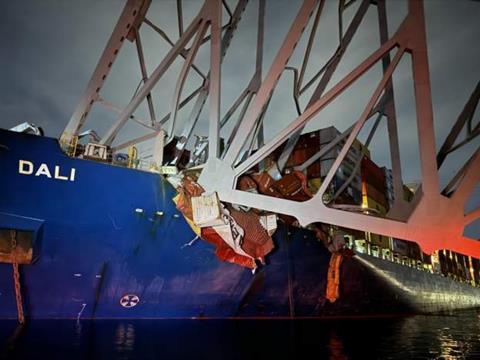
Story updated 28 March 15.24 GMT
The 290-metre Singapore-flagged container ship, Dali, struck a column on the bridge at around 1am (EST). Following the collision, the channel may not open until May.
The ship is managed by Synergy Marine Group and was chartered by Maersk at the time of the incident. It had 22 crew on board, all of whom have been accounted for with no injuries. It was carrying around 4,700 containers on board, amounting to almost half of its 10,000 capacity.
Several vehicles were on the bridge at the time of the incident, including a tractor-trailer. It is believed by authorities that eight people fell into the water, and at the time of publishing, two people have been rescued, with one in critical condition. The bodies of two construction workers were recovered on 28 March, and a further four people are still missing and presumed dead.
Baltimore is the busiest US vehicle-handling port in the US, with its vehicle terminals, including Dundalk and Fairfield, having moved 847,158 vehicles in 2023. The port has a skilled workforce, the advantages of interstate transport links and four terminal operators (Amports, Pasha Auto Services, Ports America and Wallenius Wilhelmsen Solutions), making it a popular port for finished vehicle logistics. If the port is out of action indefinitely, a resulting bottleneck could see a shift of finished vehicle logistics to other US west coast ports.
Brandon Scott, mayor of Baltimore, was asked at a press conference how long it might take to rebuild the bridge. “The discussion right now should be about the people, the lives, the souls,” he said. “There are people in the water that we have to get out and that’s the only thing we should be talking about.”
Impact on finished vehicle logistics
A source close to the incident told Automotive Logistics that due to the debris in the channel, it may not open again for vessels for more than a month. ”Preliminary assessment from the salvage engineers is that they may be able to open the channel sometime in May,” the source said. “They won’t know for sure until for a few more days, though.”
The incident is likely to have a severe impact on the movement of finished vehicles, with ship access to Chesapeake and Dundalk terminals now cut off. Currently, there is still access to Sparrows Point sub-port. Vessels have begun diverting to nearby ports.
The source added: ”At a minimum it will likely mean vessels on the water heading to Baltimore currently will need to be diverted to another Eastern US port. Mercedes-Benz has a large VPC that was impacted, and will look at Brunswick to take up the slack.”
Mercedes-Benz uses the Baltimore port for its finished vehicle logistics, along with other ports in the US including Brunswick and Charleston. A spokesperson for the OEM told Automotive Logistics that the carmaker is in close contact with its logistics service providers and are continuously monitoring the situation. The spokesperson added: ”Together with our transport partners, we continuously review and adapt our supply routes. We have several options available within our flexible supply chain network.”
Volkswagen and BMW also operate terminals at the port, although Inverto, part of Boston Consulting Group said that these can still be accessed.
A Maersk spokesperson told Automotive Logistics: ”We are horrified by what has happened in Baltimore, and our thoughts are with all those affected. We can confirm that the container vessel Dali, operated by charter vessel company Synergy Group, is time chartered by Maersk and is carrying Maersk customers’ cargo. No Maersk crew and personnel were onboard the vessel. We are closely following the investigations conducted by authorities and Synergy, and we will do our utmost to keep our customers informed.”
Maersk has released an advisory notice that due to the damage to the bridge and debris, it will not currently be possible to reach the Helen Delich Bentley port of Baltimore. In line with this, Maersk is omitting Baltimore from all services for the foreseeable future.
The shipping firm said that for cargo already on water, it will omit the port and discharge cargo set for Baltimore in nearby ports, where it can then use land transport instead.
Shipping line Wallenius Wilhelmsen said it is working with port authorities, partners and stakeholders to assess alternative solutions to minimise the effect the situation will have on its customers and ongoing operations. It added that its vessel, M/V Carmen, which had already completed cargo operations in the port of Baltimore prior to the incident remains secure alongside the port.
More updates to follow…


























![Global[1]](https://d3n5uof8vony13.cloudfront.net/Pictures/web/a/d/s/global1_726550.svgz)




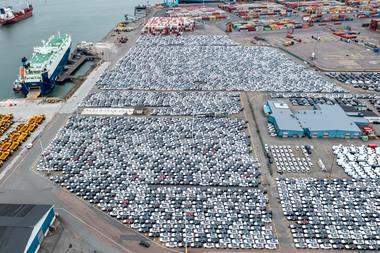
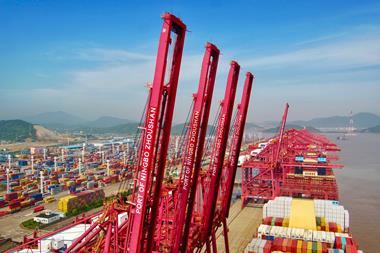
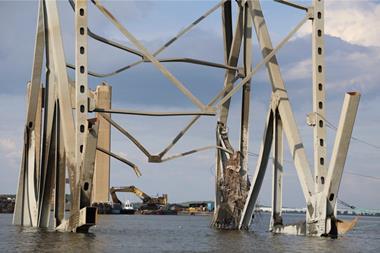
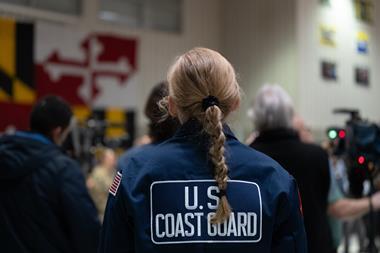
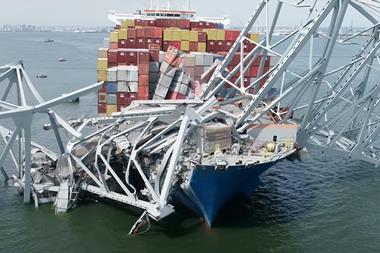




1 Reader's comment